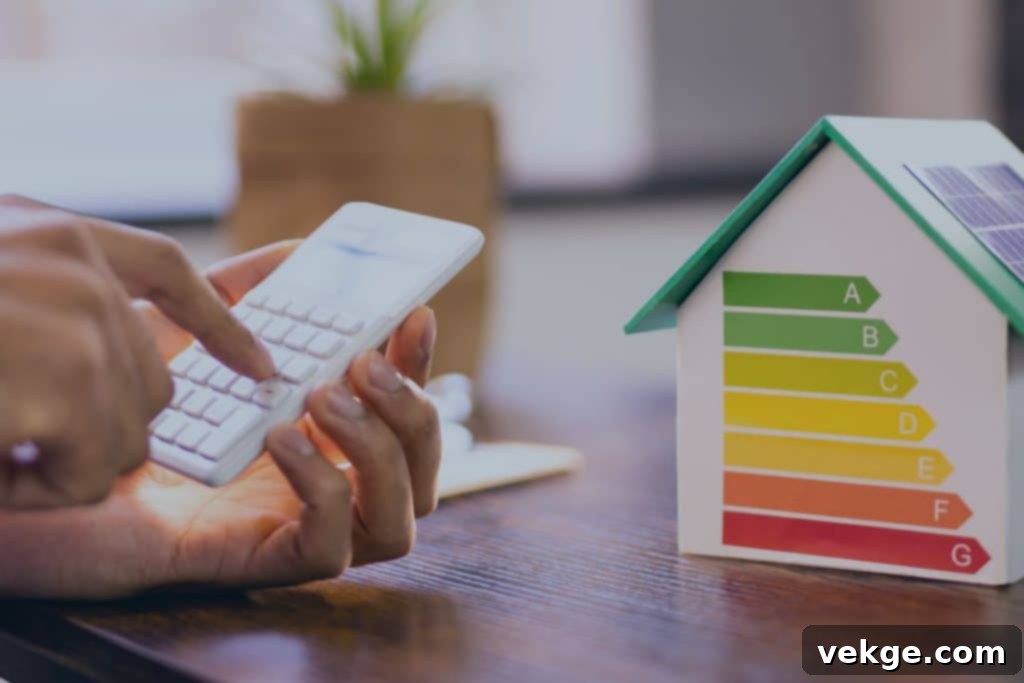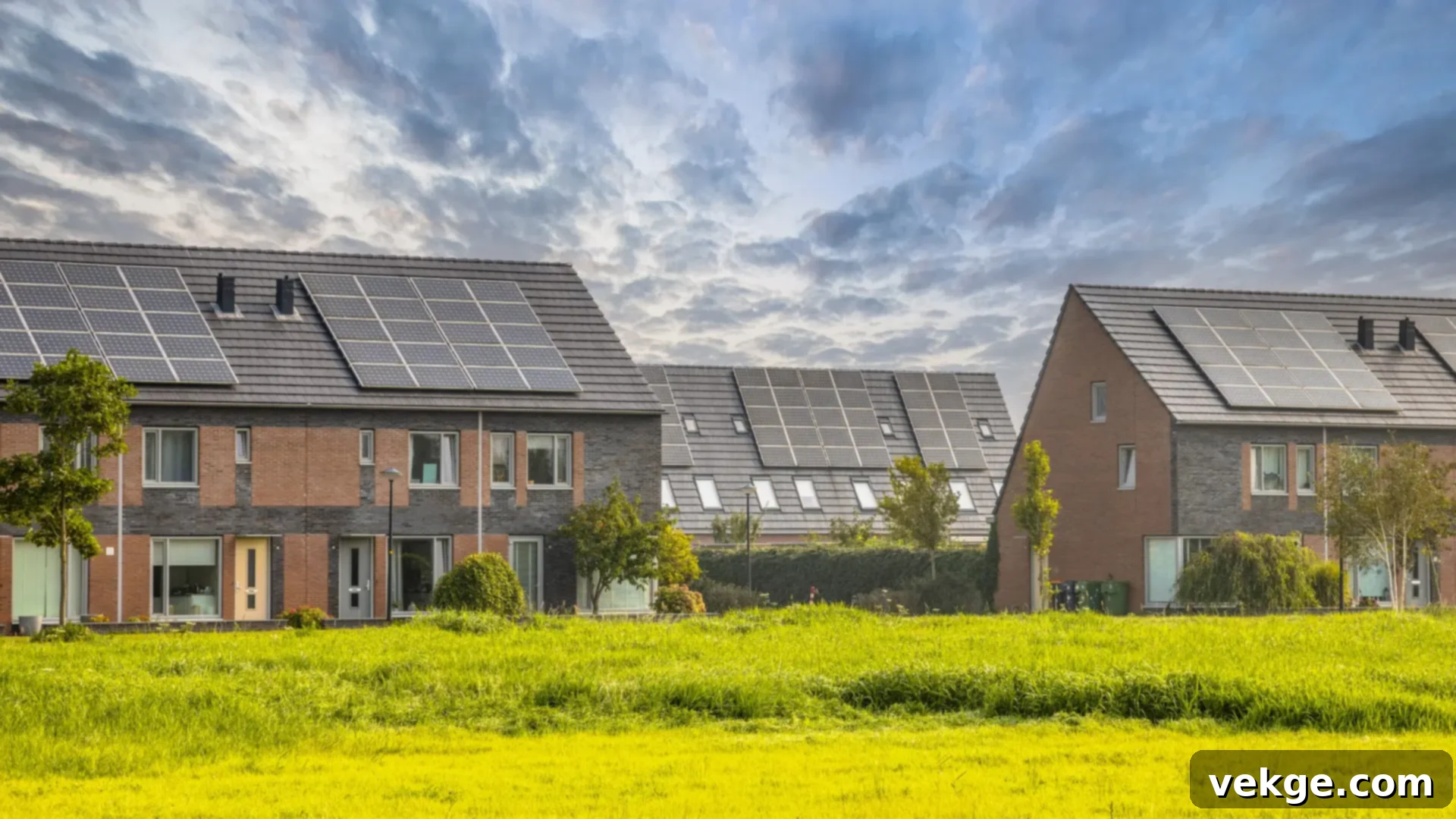Transform Your Home: A Comprehensive Guide to Reducing Energy Consumption for Sustainable Living
In today’s world, environmental consciousness is no longer just a trending topic; it has become an urgent priority. Our homes, which we cherish as personal sanctuaries, hold immense potential to become vibrant hubs for sustainable living. Rethinking our energy consumption within these spaces is not merely an optional lifestyle choice but a fundamental necessity for a healthier planet and more resilient future.
By making deliberate, conscious choices about how we use energy, we can achieve a dual benefit: significantly reducing our carbon footprint and contributing to a healthier environment, all while enjoying the tangible reward of lower utility bills. This comprehensive guide will delve into practical, impactful strategies for reimagining and optimizing energy consumption within your home, empowering you to create a more eco-friendly and cost-effective living space.
Embrace Energy-Efficient Appliances for Lasting Savings
One of the most immediate and impactful ways to reduce energy consumption in your home is through strategic investment in energy-efficient appliances. Modern innovations have transformed common household devices, from refrigerators and dishwashers to washing machines, ovens, and even water heaters, by integrating advanced energy-saving features.
When shopping for new appliances, prioritize those with high Energy Star ratings. These ratings signify that the products meet strict energy efficiency guidelines set by the Environmental Protection Agency. While the initial purchase price might sometimes be slightly higher, the long-term savings on your electricity and water bills will quickly offset this cost, making it a wise financial decision that benefits both your wallet and the environment. These appliances are engineered to perform their functions effectively while consuming significantly less power, contributing to a substantial reduction in your overall energy footprint.
Harness the Abundant Power of Natural Light
Maximizing natural light within your home is a simple yet incredibly effective strategy for reducing your reliance on artificial lighting during daylight hours. By simply keeping curtains and blinds open, you allow an abundance of sunlight to filter into your living spaces, instantly brightening rooms and creating a more open, inviting atmosphere. Beyond the aesthetic appeal, natural light has been proven to enhance mood and productivity, contributing to overall well-being.
For darker areas of your home, consider more deliberate design choices such as installing skylights or solar tubes, which channel natural light from your roof directly into interior spaces. Strategically placed mirrors can also work wonders by reflecting light and making rooms appear larger and brighter. Furthermore, choosing lighter paint colors for walls and ceilings can significantly amplify the effect of natural light, reducing the need to flick on a switch and thereby conserving energy.
Optimize Your Heating and Cooling Systems for Peak Efficiency
 Heating, ventilation, and air conditioning (HVAC) systems are often the largest contributors to household energy consumption. To significantly optimize their efficiency, focus on ensuring superior insulation throughout your home. This includes insulating walls, attics, floors, and sealing air leaks around windows and doors to prevent heat loss in colder months and keep cool air contained during summer.
Heating, ventilation, and air conditioning (HVAC) systems are often the largest contributors to household energy consumption. To significantly optimize their efficiency, focus on ensuring superior insulation throughout your home. This includes insulating walls, attics, floors, and sealing air leaks around windows and doors to prevent heat loss in colder months and keep cool air contained during summer.
Upgrading to a programmable or smart thermostat is another game-changer. These devices allow you to set specific temperature schedules based on your daily routine, automatically reducing heating or cooling when you’re away or asleep. Some smart thermostats even learn your preferences over time, further fine-tuning energy usage. Regular maintenance of your HVAC system, such as replacing air filters monthly and scheduling annual professional tune-ups, ensures it operates at peak performance, preventing energy waste and extending the lifespan of your unit.
Combat Phantom Energy and Cultivate Conscious Conservation
Many electronic devices continue to draw a small amount of power even when they are turned off or in standby mode. This phenomenon, often referred to as “phantom energy” or “vampire drain,” can cumulatively account for a significant portion of your electricity bill over time. Devices like TVs, computers, phone chargers, gaming consoles, and even coffee makers contribute to this invisible energy drain.
To combat phantom energy effectively, make a habit of unplugging devices when they are not in use. A more convenient solution is to use power strips equipped with an on/off switch. By plugging multiple devices into a single power strip, you can effortlessly cut power to all of them with one flick of a switch. Beyond unplugging, cultivate mindful habits in your daily routine, such as turning off lights when leaving a room, switching off fans when not needed, and being conscious of excessive streaming or gaming. These small behavioral changes, when consistently applied, lead to substantial energy savings over the long run.
Integrate Renewable Energy Solutions for Future Sustainability
Embracing renewable energy sources is a monumental step towards true energy independence and environmental stewardship. Consider working with a reputable solar panel installation company to integrate systems like solar panels onto your home. While the initial investment might seem considerable, the long-term benefits are profound. Solar panels drastically reduce your reliance on fossil fuels, leading to significantly lower, or even non-existent, utility bills for decades.
Furthermore, many regions offer generous government incentives, tax credits, and rebates to offset the upfront cost of installation, making renewable energy more accessible than ever. Some utilities even offer net metering programs, allowing you to sell excess electricity generated by your panels back to the grid. Beyond the financial advantages, installing solar panels increases your home’s value and provides a tangible demonstration of your commitment to a sustainable future, drastically reducing your personal carbon footprint and contributing to a cleaner energy landscape.
Cultivate Sustainable Habits and a Mindful Lifestyle
 Ultimately, the foundation of sustainable living is built upon individual actions and a collective mindset. It’s crucial to foster energy-conscious habits among all household members. Simple acts, when performed consistently, create a significant impact. Encourage everyone to turn off lights when exiting a room, take shorter showers, and consider air-drying clothes instead of relying solely on energy-intensive dryers.
Ultimately, the foundation of sustainable living is built upon individual actions and a collective mindset. It’s crucial to foster energy-conscious habits among all household members. Simple acts, when performed consistently, create a significant impact. Encourage everyone to turn off lights when exiting a room, take shorter showers, and consider air-drying clothes instead of relying solely on energy-intensive dryers.
Other small changes include using cold water for laundry whenever possible, planning errands efficiently to minimize vehicle use, and fully loading dishwashers and washing machines before running them. By instilling a culture of mindfulness, responsibility, and respect for resources, you can collectively reduce overall energy consumption and transform your home into a truly eco-friendly environment where sustainable choices are the norm, not the exception.
Leverage Smart Home Technology for Enhanced Efficiency
Integrating smart home technology offers an unprecedented level of control and insight into your home’s energy consumption. Smart thermostats, for instance, go beyond simple programming; they can learn your family’s preferences and daily patterns, automatically adjusting heating and cooling to optimize comfort and energy usage without constant manual input. Many even offer geofencing features, adjusting temperatures based on your proximity to home.
Similarly, smart lighting systems allow for remote control, scheduling, and even dimming, ensuring lights are only on when and where needed, and at the appropriate brightness. Beyond these, smart plugs can turn any ordinary appliance into a “smart” one, allowing you to monitor and control its power draw remotely. Energy monitoring systems provide real-time data on your household’s electricity usage, helping you identify energy hogs and make informed decisions to achieve greater savings and unparalleled convenience simultaneously.
Implement Effective Water-Saving Measures at Home
While often overlooked, water consumption is intrinsically linked to overall energy usage within the home, primarily due to the energy required to heat water for showers, laundry, dishwashing, and other domestic uses. Therefore, implementing water-saving measures directly contributes to energy conservation.
Installing low-flow fixtures such as faucets, showerheads, and toilets can dramatically reduce water usage without compromising performance or comfort. These devices are designed to use less water while maintaining adequate pressure. Beyond fixtures, consider innovative solutions like capturing rainwater for outdoor irrigation or installing a greywater recycling system. Greywater systems reuse water from sinks, showers, and laundry for non-potable purposes like flushing toilets or watering gardens, further conserving precious resources and reducing the energy spent on treating and delivering potable water.
Conduct Regular Home Energy Audits for Insightful Improvements
 Regular energy audits provide invaluable insights into precisely where and how energy is being consumed, and often wasted, within your home. While you can conduct DIY audits by closely monitoring utility bills and identifying consumption trends, professional energy auditors offer a much more thorough and precise assessment.
Regular energy audits provide invaluable insights into precisely where and how energy is being consumed, and often wasted, within your home. While you can conduct DIY audits by closely monitoring utility bills and identifying consumption trends, professional energy auditors offer a much more thorough and precise assessment.
These experts utilize specialized equipment, such as blower door tests to pinpoint air leaks and thermal imaging cameras to detect insulation deficiencies. They assess the efficiency of your heating, cooling, and water heating systems, and even evaluate your home’s lighting and appliance usage. Armed with this detailed information, homeowners can prioritize upgrades and renovations that offer the most significant return on investment, maximizing energy savings and enhancing overall comfort and indoor air quality. Many solar companies or general home efficiency companies offer these services as part of a holistic approach to home energy management.
Partnering for a Greener Future: Choosing the Right Solar Company
While the initial decision to go solar is a significant step towards sustainability, choosing the right solar energy company is equally crucial for a successful and long-lasting installation. This partnership will determine the quality of your system, its efficiency, and the level of support you receive over its lifespan. It’s essential to perform due diligence when selecting a provider.
When evaluating potential solar companies, consider factors such as their industry experience, local reputation, customer reviews, and relevant certifications. Inquire about their warranty offerings for both equipment and installation, and understand their process for ongoing maintenance and customer support. Look for transparent pricing and clear explanations of financing options, including loans, leases, and power purchase agreements. A reputable company will provide a detailed proposal, including estimated energy production and financial savings. Making an informed decision ensures you receive the best possible service, a high-performing system, and a reliable partner in your journey towards energy independence and a greener tomorrow.
In conclusion, rethinking energy consumption within our homes is far more than just a matter of environmental stewardship; it’s a practical, financially smart, and essential step towards building a more sustainable and resilient future. By thoughtfully adopting energy-efficient technologies, optimizing our existing systems, and diligently cultivating mindful habits, we hold the power to transform our homes into shining beacons of eco-conscious living. Every small adjustment, every informed decision, contributes to a larger positive impact.
Together, let’s embrace the exciting challenge of reducing our collective footprint, fostering a deeper connection with our planet’s resources, and paving the way for a healthier, more prosperous, and undeniably greener tomorrow. The journey to a sustainable home is an ongoing one, filled with continuous opportunities for improvement and innovation, benefiting not just ourselves, but generations to come.
